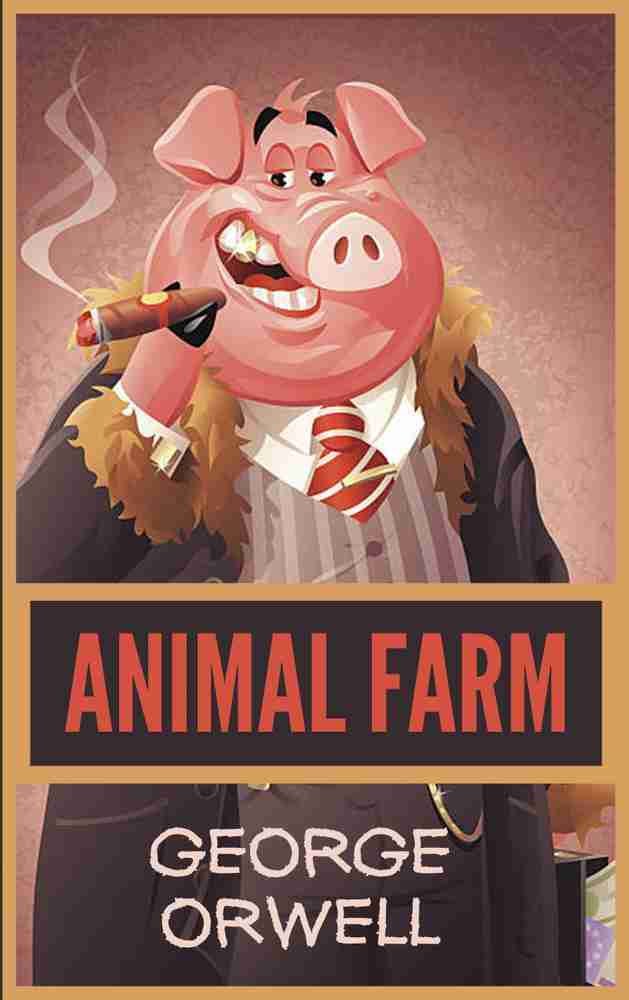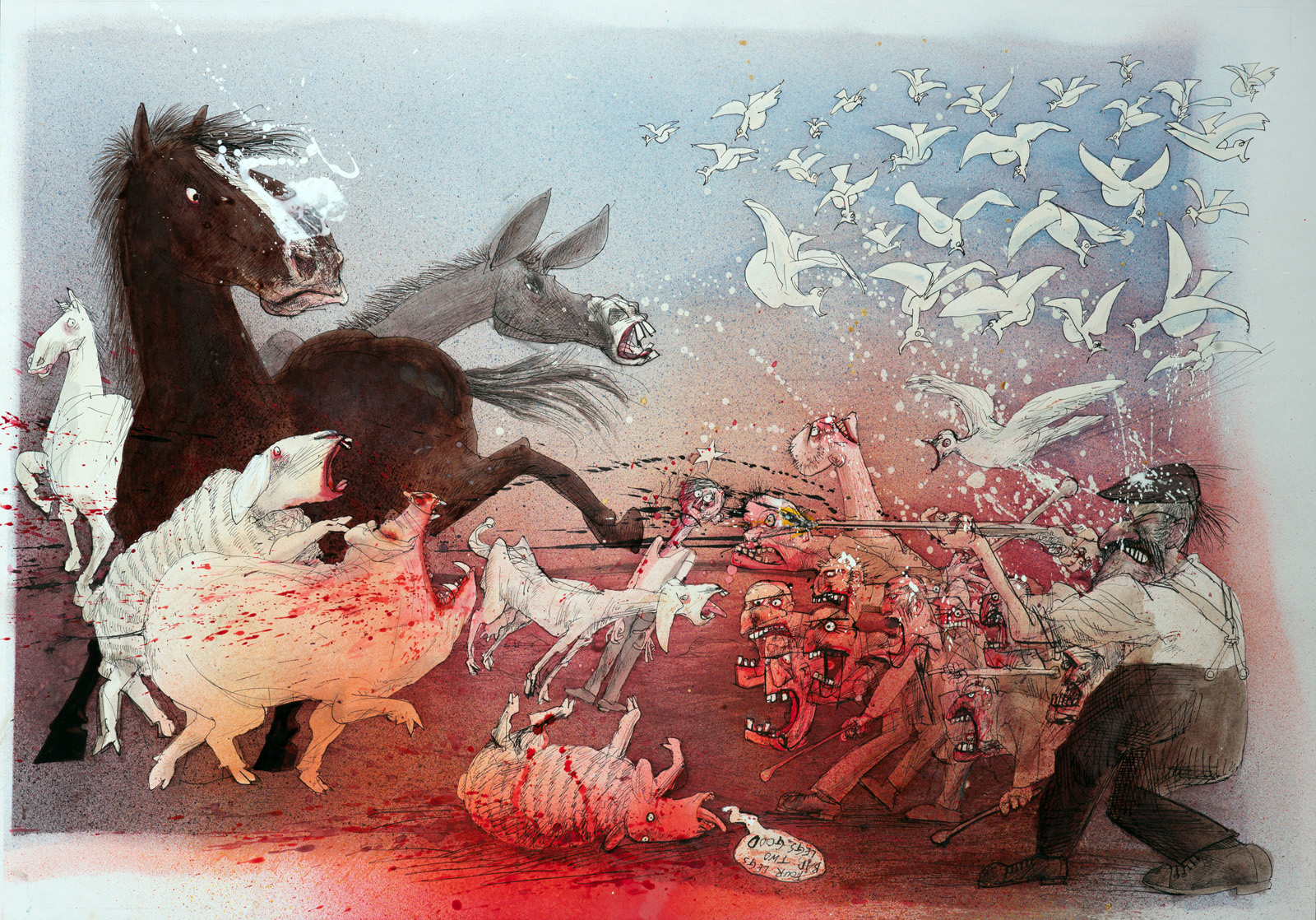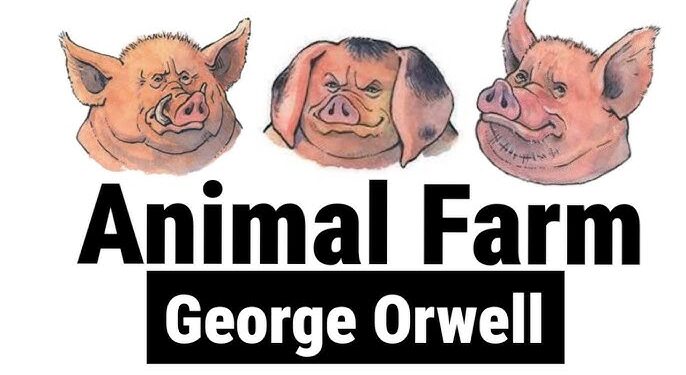Introduction to “Animal Farm”
Novel Animal Farm Summary By George Orwell is a novella written by George Orwell in 1945, which serves as a political allegory that critiques the events leading up to the Russian Revolution of 1917 and the subsequent rise of Stalinism in the Soviet Union. The novel presents a satirical view of power, corruption, and the manipulation of ideals for political gain. Orwell uses a farm and its animal inhabitants to symbolize broader social, political, and economic structures.
The plot follows the rise and fall of a revolutionary movement initiated by the animals of Manor Farm, led by the pigs, who overthrow their human owner, Mr. Jones, in an effort to create a society of equals. However, as the pigs gain power, they adopt many of the same oppressive tactics as their human oppressors, leading to a new tyranny under the guise of equality.Novel Animal Farm Summary By George Orwell
Plot Summary of Animal Farm
Chapter 1: The Vision of Old Major
The novel begins with the animals on Manor Farm, where they are poorly treated by their human owner, Mr. Jones, a drunken and irresponsible farmer. One night, an old and wise boar named Old Major calls a meeting of all the animals. He speaks of a vision of a world free from human oppression, where animals can live in equality and freedom. He urges the animals to rise up and overthrow their human masters.
Read More
Old Major outlines his idea of “Animalism,” a philosophy that opposes human exploitation and promotes unity among animals of all kinds. He inspires the animals to rebel, and before his death, he passes on the responsibility for revolution to two pigs: Snowball and Napoleon.

Chapter 2: The Rebellion Begins
After Old Major’s death, the animals, led by Snowball and Napoleon, organize a rebellion. They work together to overthrow Mr. Jones, and after a fierce struggle, they successfully drive him off the farm. The animals take over the farm, renaming it “Animal Farm” as a symbol of their newfound freedom.Novel Animal Farm Summary By George Orwell
The pigs adopt the principles of Animalism, creating seven commandments that all animals must follow. These commandments are meant to guide the animals in their new society, emphasizing equality and unity. The animals work hard to grow their food and manage the farm, and for a while, there is hope and optimism as they begin to enjoy the fruits of their labor.
Chapter 3: Initial Success and Hard Work
The animals work diligently to harvest the crops, and the farm becomes more productive than it had been under Mr. Jones. The pigs take on the role of leaders, and Snowball and Napoleon organize the animals into groups to work efficiently. Boxer, a hardworking and strong horse, becomes the farm’s most dedicated laborer, embodying the working class’s loyalty to the revolution.
Despite initial success, there are signs that not all is perfect. The pigs begin to take more authority, and Squealer, another pig, starts to manipulate language and propaganda to justify their decisions. Snowball and Napoleon begin to quarrel over the direction of the farm, particularly about the construction of a windmill that Snowball proposes to increase production.Novel Animal Farm Summary By George Orwell
Chapter 4: The Battle of the Cowshed
As the animals continue to solidify their power, Mr. Jones tries to retake the farm with a group of human allies. The animals, however, fight back with great courage. Snowball plays a heroic role in the battle, leading the charge to defend the farm. The humans are driven away, and the animals celebrate their victory. Snowball is hailed as a hero, and a medal is awarded to him for his bravery in the battle.
Read More
Chapter 5: Snowball’s Exile and Napoleon’s Rise to Power
The struggle for power between Snowball and Napoleon intensifies. Snowball passionately advocates for the construction of the windmill, which he believes will help the animals work less and produce more. Napoleon, on the other hand, opposes the plan, arguing that it is too ambitious. One night, during a heated meeting, Napoleon uses his trained dogs to chase Snowball off the farm, and Snowball is exiled.
With Snowball out of the picture, Napoleon assumes total control of Animal Farm. He uses the dogs as enforcers and begins making decisions that benefit the pigs and himself. Napoleon revises the commandments to justify the pigs’ increasingly privileged lifestyle, and the farm begins to fall into disarray as the pigs abuse their power.Novel Animal Farm Summary By George Orwell
Chapter 6: The Corruption of the Pigs
As the years pass, the animals continue to work hard, but the benefits of the revolution are increasingly concentrated in the hands of the pigs. The pigs start to live in luxury, drinking alcohol, and even engaging in trade with humans, which was once forbidden. The animals realize that they are not living in the equality they were promised, but the pigs constantly manipulate the truth through propaganda, led by Squealer, who alters history and facts to keep the animals compliant.
One of the most heartbreaking moments is when Boxer, the hardworking horse, is injured while working on the windmill. Napoleon promises that Boxer will be sent to the vet, but the animals later discover that Boxer has been sold to a glue factory.
Chapter 7: The Descent into Tyranny
Napoleon’s rule becomes more tyrannical. He continues to use fear to control the animals, holding show trials where animals who confess to being traitors are executed. The farm’s situation grows more desperate, and food shortages occur, but the pigs continue to live in comfort. The animals work harder than ever, but their conditions worsen.
Napoleon continues to make alliances with humans, contradicting the original principles of Animalism. Meanwhile, the pigs enjoy privileges that were once reserved for humans, such as living in the farmhouse and drinking alcohol. The animals begin to notice that the farm’s commandments are being altered to suit the pigs’ needs, but they have little choice but to accept the changes, as they fear the consequences of rebellion.
Chapter 8: The Final Betrayal
As time passes, the pigs increasingly resemble humans in both appearance and behavior. They walk on two legs, wear clothes, and engage in the same corrupt activities that the humans once did. The animals can no longer distinguish the pigs from the humans they once rebelled against. The final commandment, which originally stated that “All animals are equal,” is changed to “All animals are equal, but some animals are more equal than others.” This is the ultimate betrayal of the revolution’s ideals.
In the end, the farm is in a state of ruin. The animals are more miserable than ever, and the dream of a society where all animals are equal has been entirely crushed.

Themes in “Animal Farm”
- The Corruption of Power
Orwell explores how power can corrupt, even those who initially champion equality and justice. The pigs, who are the leaders of the animal rebellion, gradually become more like their human oppressors, demonstrating how revolutionary ideals can be manipulated for personal gain.Novel Animal Farm Summary By George Orwell - The Dangers of Totalitarianism
“Animal Farm” serves as a critique of totalitarian regimes, particularly Stalinist Russia. Napoleon’s rise to power parallels Joseph Stalin’s leadership in the Soviet Union, and the novel explores the mechanisms of control used by authoritarian regimes, including propaganda, fear, and repression. - The Betrayal of Ideals
The novel reflects how revolutionary ideals can be distorted and betrayed by those in power. The animals’ dream of a society where all are equal is gradually eroded by the pigs’ greed and corruption, ultimately resulting in a society that is just as oppressive as the one they overthrew. - The Role of Propaganda and Language
Orwell highlights the power of language and propaganda as tools for controlling the masses. The pigs, especially Squealer, use rhetoric and manipulation to justify their actions and keep the animals subdued, even when their situation is deteriorating.
Read More
- Class Struggle
The novel explores the class divisions that exist even in a supposedly equal society. The pigs, representing the ruling elite, exploit the other animals, who represent the working class. The pigs enjoy the benefits of their power, while the working animals suffer and continue to labor under increasingly harsh conditions.Novel Animal Farm Summary By George Orwell
(FAQ)
1. What is the significance of the title “Animal Farm”?
The title “Animal Farm” symbolizes the farm’s transformation from a place of freedom and equality to one of tyranny and oppression. The animals, once free from human exploitation, ultimately find themselves under the control of the pigs, who become indistinguishable from the humans they overthrew.
2. Who do the characters in “Animal Farm” represent?
- Old Major represents Karl Marx or Vladimir Lenin, the ideologues who inspire revolution.
- Napoleon represents Joseph Stalin, the authoritarian leader who seizes power and uses brutal methods to maintain control.
- Snowball represents Leon Trotsky, who was ousted from power by Stalin.
- Squealer represents propaganda and the manipulation of information to control the population.
- Boxer represents the working class and their blind loyalty to the revolution.
- Mr. Jones represents the Tsarist regime and the oppressive rule of the Russian monarchs.
3. Why does Napoleon expel Snowball from the farm?
Snowball represents a challenge to Napoleon’s authority. Napoleon uses Snowball as a scapegoat for any problems that arise on the farm, and ultimately drives him out in order to consolidate his power.
4. What is the significance of the pigs walking on two legs at the end of the novel?
The pigs walking on two legs symbolizes their complete transformation into the very humans they once opposed. This final image shows how the revolution has failed and how the pigs have become just as corrupt as the human rulers they initially overthrew.
5. What lesson does “Animal Farm” teach about revolutions?
“Animal Farm” warns that revolutions, while often driven by noble ideals, can easily be corrupted by those in power. It highlights how power can be abused, and how those who initially fight for equality may end up perpetuating the same systems of oppression.
6. Is there any hope in “Animal Farm”?
The novel suggests that there is little hope for meaningful change within the system, as the animals are ultimately subjugated by their leaders. However, Orwell’s critique is a call to action for vigilance and resistance against tyranny.
Read More
















